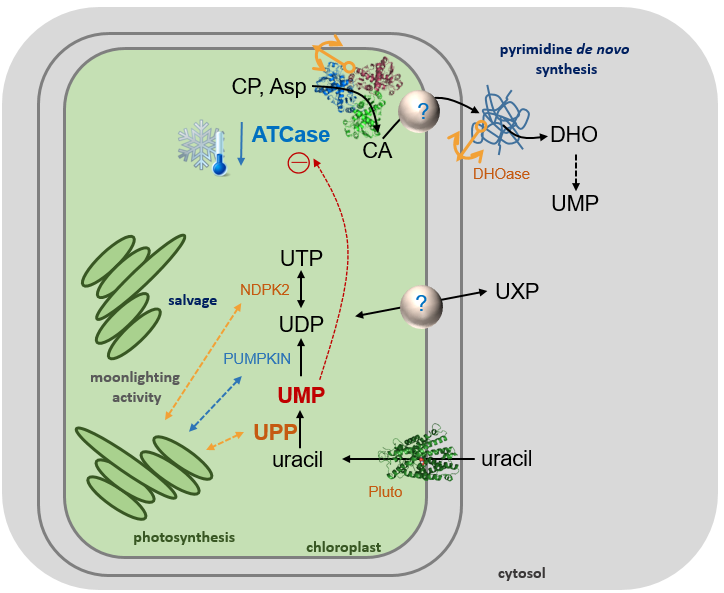B08
Chloroplast nucleotide homeostasis and its interplay with photosynthesis during cold acclimation
During cold acclimation, energy is required for a reprogramming of metabolism including adaptation of chloro-plastic energy production. In our preliminary work, we have gathered evidence for an interplay between nucleotide metabolism and cold acclimation at the level of the two pyrimidine metabolic enzymes UPP and ATCase. We pro-pose to study the function (incl. moonlighting!) of UPP at the molecular level and unravel the mechanism and im-pact of a temperature dependent differential localization of ATCase at the chloroplast envelope. Additionally, with help of a large set of UPP and ATCase mutants, we propose to study the effect of an altered nucleotide and thus energy provision under cold acclimation in detail.

Chloroplast pyrimidine metabolism linked to cold acclimation. Pyrimidine de novo synthesis initiates in chloroplasts by converting carbamoyl-phosphate (CP) and aspartate (Asp) to carbamoyl-aspartate (CA) by aspartate transcarbamoylase (ATCase) and is finalized in the cytosol (Witz et al. 2012). ATCase was found in chloroplast envelope preparations, being massively downregulated upon cold. Dihydroorotase (DHOase) is supposed to be anchored to the outer chloroplast membrane from the cytosolic side. UMP (uridine monophosphate) is a potent inhibitor of ATCase activity (Bellin et al. 2020) and chloroplastidic UMP levels are controlled by uracil phosphoribosyltransferase (UPP) and the plastidic UMP kinase PUMPKIN (Ohler et al. 2019, Schmid et al. 2019). UPP, PUMPKIN and the nucleoside diphosphate kinase 2 (NDPK2) exhibit so called moonlighting activities with vital functions for photosynthesis, presumably not directly linked to their catalytic activities in pyrimidine salvage, which is an active pathway in chloroplasts (Ohler et al. 2019, Schmid et al. 2019, Dorion and Rivoal 2015; summarised in Arrivault 2019). A PUMPKIN homolog from rice was found highly expressed under cold and a corresponding EMS mutant showed yellow leaves, reduced UDP contents and lower survival rate when grown at low temperature (6°C, two days; Dong et al. 2019). Pluto (plastidic nucleobase transporter)

